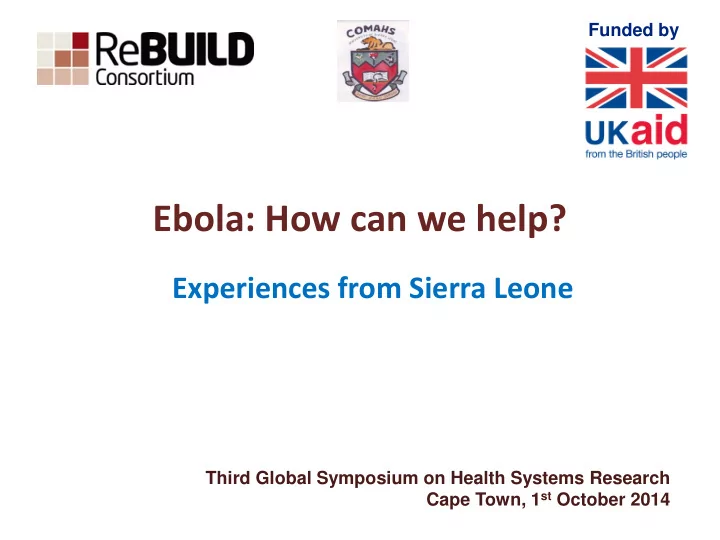

Funded by Ebola: How can we help? Experiences from Sierra Leone Third Global Symposium on Health Systems Research Cape Town, 1 st October 2014
Funded by Ebola Updates – 29 th September 2014 Cumulative confirmed cases – 2095 Cumulative confirmed deaths – 544 Survivors - 434
Funded by Health system in Sierra Leone In Sierra Leone the health system is divided into six pillars Governance including decentralisation Human resource for health – including training and development Service delivery – including health education and promotion Infrastructure Drugs and technology Research, monitoring and evaluation The current Ebola outbreak has further highlighted the challenges in all the six pillars mentioned above.
Funded by Situation on the ground Health Workers Health services Demotivated Decreased assess to health services and negatively Financial and non financial incentives impacted other health Ill equipped and not fully programmes trained in effective infection History of under-performing, control measures health service delivery, Victims coupled with high levels of out of pocket spending Stigmatised in society shifted health-seeking behaviour towards traditional healers and drug peddlers.
Funded by What can be done to help? Evidence based research to address the challenges facilitators and enablers of an effective response to the current Ebola crisis in Sierra Leone Recommendations for building an effective and efficient response system for future communicable disease outbreaks how aspects of the system can be changed to ensure it is better able to cope and respond to infectious outbreaks in the future. Efficient relations with external partners to allow for continuity of research More engagement between evidence based researchers and decision makers
Funded by The way forward Overall goal An emergency response plan should be put in place for future outbreaks of this nature, as in other countries e.g. Uganda Evidence-based health systems research and strengthening should be an utmost priority Leadership and governance Local capacity built to ensure effective leadership and governance systems are in place, addressing the challenges Health systems Health worker motivation package should be developed, including training Challenges that impede efforts in achieving UHC should be addressed particularly in the marginalised rural areas Health facilities should be fully equipped Community involvement Health education and promotion should be a priority both at central and district levels, with community participation
Funded by Thank you www.rebuildconsortium.com
Recommend
More recommend